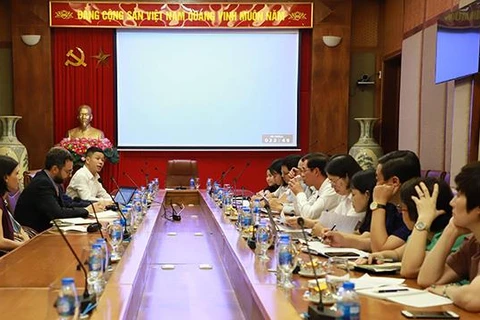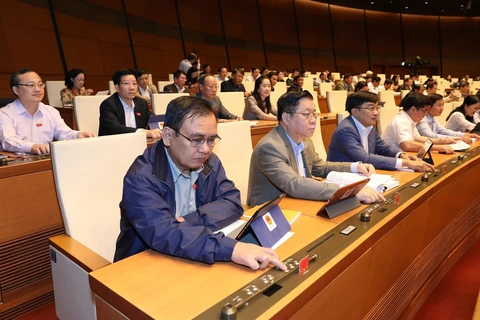 Tim De Meyer, Senior Advisor on Standards Policy at the International Labour Organisation (ILO) (Source: VNA)
Tim De Meyer, Senior Advisor on Standards Policy at the International Labour Organisation (ILO) (Source: VNA)
Hanoi (VNA) - The revised Labour Code, which was adopted by the National Assembly in November 2019, has helped Vietnam reach closer to international labour standards, according to experts.
Tim De Meyer, Senior Advisor on Standards Policy at the International Labour Organisation (ILO), granted an interview to reporters on this issue.
Question: What are the significant changes in the draft revised Labour Code? And what do they mean to Vietnamese labourers?
Answer: The Labour Code in Vietnam is a very comprehensive document that deals with many issues, such as employment contracts, the ability of workers to negotiate with their employers, minimum standards for working conditions, protection of safety and health and so on.
In all of these areas, the current revision process is contemplating significant changes. In my opinion, there are two particularly significant changes. One big change is the ability workers should now have the chance, at enterprise level, to form representative organisations and engage in a collective bargaining process that enables workers to get a fair share of the profits they help generate on one hand but also on the other hand enables enterprises to make sure that they can negotiate the productivity improvements necessary for them.
The other big change is the expansion of the scope of the Labour Code. That means many more workers than in the past will be in a position to benefit from the protection by the Labour Code.
Question: Vietnam’s Labour Code is now better in line with international labour standards. Can you explain this point?
Answer: I think the most significant progress towards better alignment with International Labour Standards is the right of employers and workers to organise, which means to form organisations representing them to engage in meaningful negotiations about working conditions. It’s very meaningful because it will enable employers and workers to adjust to changes in the labour market and to negotiate the flexibility that is necessary to remain sustainable over a longer period of time.
We're also seeing progress in the employment relationship which is firmly embedded in the Labour Code. The better the employment relationship is recognised as a means of protecting workers who work according to the instructions of an employer, the easier it becomes for workers to claim the protection within the Labour Code, as the employment relationship is the entry door into the Code. So we hope with that it will be possible to align the situation in Vietnam better with international standards for example on minimum wage, making sure that a much bigger number of workers have a minimum wage to sustain their families on.
Question: Which specific issues in the Code still have room for improvement?
Answer: I think in particular they are issues with respect to the promotion of equality. We see inequality on the rise everywhere in the world today, particularly inequality of income but also inequality of opportunities.
Vietnam is an aging society, so one of the issues is that productivity will have to go up, skills levels will have to increase to make the best of everyone’s productive potential. That means more women need to be able to make their productive potential available to a labour market that fairly rewards them. But that does mean a number of protective provisions in the Labour Code need to be revised.
Maternity protection needs to be strengthened, access to affordable domestic work, protection against sexual harassment, and a wider range of occupations and economic activities that are open to women and that traditionally have been closed to women for protective reasons. So I think that is an area where the Labour Code can still make a fairly significant amount of progress.
Question: The line between protecting women’s rights and opportunities for them is quite blur. How could this be improved?
Answer: I think much is the matter of mind set, not only a matter of legal drafting. You should ask yourself in the world today, with the opportunities created by trade liberalisation, what need is there still for the many protections provided by the law in comparison to the opportunities and to the choices women should have to accept the work that they feel they can carry out, to accept the contribution they can make to a growing economy. That is really the question. Around the world, many countries have gone already to at least partially through that transition and sometimes in the areas that you would not immediately consider.
Let me just give one example. Underground work in mines was traditionally closed for women, the ILO has had an international standard prohibiting such work since 1935 and Vietnam has still ratified that standard. But major mining countries such as South Africa and Australia have opened the mining industry for women since a good number of years.
The technology has made it possible for women to use the equipment that was originally designed for men. It has been good for women, it has been good for economic growth, and it has been good for the cohesion also of the society as all these mining communities were traditionally remote and exclusively populated by men. So this is just an example of how, by opening up equality of opportunity and treatment, everyone can be better off.
Question: Where is Vietnam in the world in terms of labour laws development?
Answer: Traditionally, Vietnam has a very extensive system of laws on paper. However the more you stipulate in the laws and the more economic activity diversifies, the more difficult it becomes for everyone in the economy to live up to the standards in the laws.
Therefore the important transition Vietnam needs to make is to put more emphasis on the importance of contracts, enabling employers and workers both individually and collectively to negotiate the working conditions that are the most appropriate to fit their own situation.
So I think the change that Vietnam still has to go through now, it's not so much to put more on paper but to make sure that what is on paper better fits the needs of workers and employers.
Thank you so much./.
























